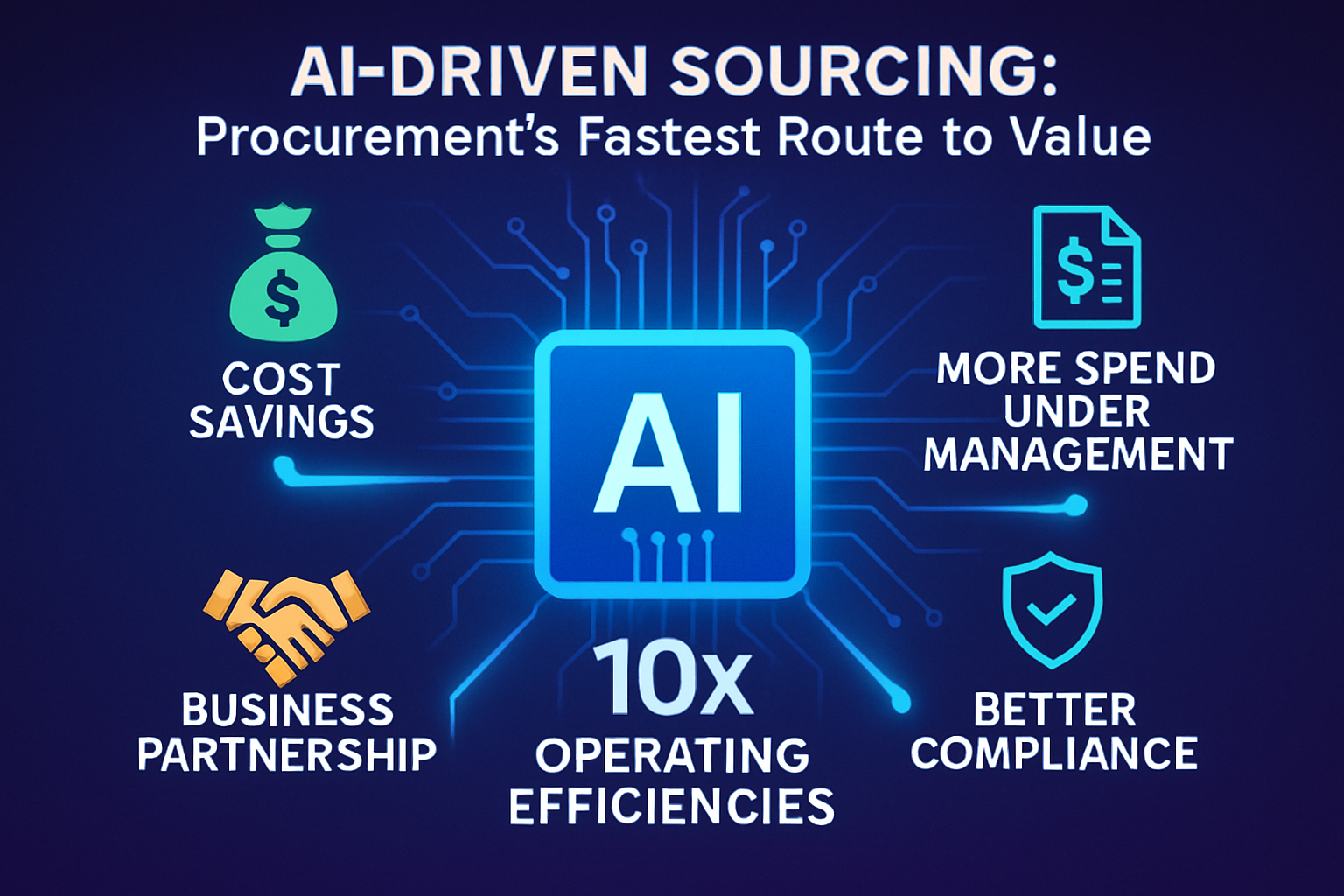AI in procurement: A blueprint for autonomous operations

The integration of Artificial Intelligence into the workplace is a topic of widespread discussion, particularly in the realm of autonomous operations. I have been building AI products since 2007 starting with VideoSurf, a company I founded to develop computer vision and audio recognition. My AI focus continued at Microsoft, when they acquired VideoSurf, and it continued through to my biggest, most ambitious company, Globality.
I believe that AI is akin to an avocado— not ready, not ready, not ready, then overnight it's so ripe that if you don't consume it now, it will be too late. Kidding aside, AI took years to develop into an “overnight” success. Those who do not act now risk falling behind competitors and missing out on critical efficiencies and innovations. Individuals who are hesitant to adopt AI will face negative consequences in their careers. On the other hand, those who advocate for and embrace AI will be promoted to become the next leaders in their domains.
As companies navigate the vast opportunities presented by exponential technological advancements, deciding which AI projects to prioritize becomes a significant challenge. Not every initiative will prove effective, and some, while functional, may not significantly impact the bottom line. These factors should guide the selection of AI projects:
- Evaluating the applicability of AI to the department or area of your company that you lead.
- ROI: Assessing the impact, i.e., determining whether it moves the needle.
- Considering the need for disruption and the opportunities for improvement compared to the status quo.
These are the three parameters that any executive should evaluate now to determine where to start. Let’s delve into the details to understand the applicability of AI to a specific function.
Understanding the applicability of AI
AI holds immense potential to significantly enhance and streamline operations across departments, including marketing, engineering, customer service, and more. The key to unlocking this potential lies in identifying the defining characteristics of top talent within these functions and envisioning how AI can embody similar attributes to better support their work. Given the unique circumstances of each company, the objective may be to enhance their effectiveness, do more with less, or over time, reduce headcount.
While navigating this sensitive topic, it's prudent to develop a forward-thinking perspective on what job descriptions for talent might entail in an AI-driven era. For example, in procurement, key elements could include high emotional intelligence, a strong business background, understanding business context as much as the business does, excellent communication and collaboration skills to navigate complex value chains, and other strategic skills that machines cannot replicate.
However, in procurement today typical professionals are process-oriented, with negotiation skills and a comprehensive understanding of policy enforcement. They excel in financial analysis, document drafting, requirement gathering, stakeholder interaction, and prioritizing various tasks. Their ability to manage time effectively, report clearly, escalate proactively, and forecast accurately makes them invaluable.
Let's explore the characteristics of AI and how they can be leveraged to support the human talents outlined above:
- Interview and collect requirements: AI agents can automate the initial stages of procurement by interviewing stakeholders and gathering requirements with precision and intelligence. This ensures a clear understanding of needs from the outset. Recent advancements in LLM technology enable a truly humanized, machine-led interview process that is dynamic and personalized. Modern LLMs have achieved a much higher level of natural language processing capability. They can understand context better and generate coherent, contextually appropriate responses. LLMs combine linguistic prowess, contextual awareness, and adaptability to revolutionize requirements gathering. Their human-like interactions foster collaboration, reduce ambiguity, and set the stage for successful procurement processes.
- Exceptional writing and articulation: AI's ability to generate detailed project scopes, proposals, and reports ensures that all procurement activities are well-documented and articulated, facilitating clear communication across departments and in between buyer and seller. This aligns perfectly with the extensive narrative requirements of buying and sourcing, showcasing LLM's potential to streamline complex language-based tasks. LLMs generate content swiftly and efficiently. They do not suffer from fatigue or variations in writing quality. They comprehend industry specific jargon, allowing them to communicate to experts and laypersons alike. Even language is not a barrier, allowing easy communication across cultures and borders.
- Triage and logic understanding: AI can classify and direct sourcing events to the appropriate processes through logical analysis, ensuring efficiency and compliance with organizational protocols. The combination of LLM's understanding of user intent, alongside the configuration of companies' rules and policies, plus the machine learning aspect of selecting the most logical path, enables AI to guide users towards the optimal journey. With recent models having increasingly long context windows, LLMs can logically analyze complex sourcing events and route them appropriately. Like a procurement professional, LLMs can dynamically adjust their triage decisions based on urgency, resource availability, stakeholder priorities, historical data, and user preferences. Retrieval Augmented Generation (RAG) allows LLMs to access procurement-specific information to help with these decisions.
- Process journey implementation and guardrail enforcement: Through automation and AI-driven workflows, procurement processes are streamlined, and compliance with policies is enforced, reducing human error and enhancing efficiency. LLMs can be trained on organizational policies, legal guidelines, and compliance requirements. When integrated into procurement workflows, they ensure that every step adheres to established rules. By automating routine tasks, LLMs significantly reduce the risk of human error. They consistently apply policies, cross-check data, and flag any deviations, leading to more accurate and compliant processes. They can adapt to changing policies or process modifications, learning from new examples, and adjusting their behavior accordingly.
- Marketplace dynamics and negotiation: AI technologies can introduce competition in terms of cost and quality, analyze proposal trends, and conduct negotiations to secure the best prices, contributing to significant cost savings for the organization. Recent research has shown that LLMs can consistently reach successful deals in negotiation scenarios.
- Collaboration across business units: AI facilitates seamless collaboration and orchestration among procurement, finance, legal, and other business units, ensuring that all stakeholders are aligned and informed. An AI agent interacts and converses with all parties to ensure speed and precision. LLMs do not have the biases and incentives that individuals have, ensuring they work for the best outcome for all involved.
- Proposal analysis and decision-making: AI excels in analyzing proposals by swiftly processing vast amounts of data, identifying patterns, and extracting insights that might be overlooked by human analysts. Moreover, AI can efficiently run models and scenarios regarding proposals, providing rapid simulations and predictive analytics to assess various outcomes. Essentially, AI functions as a virtual analyst, capable of handling complex tasks with speed and precision, thus augmenting decision-making processes and optimizing resource allocation.
The ideal place to start?
Beginning the AI journey with procurement is a strategic choice that promises not only immediate benefits in terms of cost savings and operational efficiency but also sets the stage for a holistic transformation across the organization. It's a testament to the potential of AI to act as a catalyst for innovation, pushing the boundaries of what's possible and paving the way for a future where intelligent automation enhances every aspect of business operations.
Globality can help you use AI to deliver immediate new productivity and efficiencies across your company spend while cutting costs by 20% from day one. Click here to request a demo.



